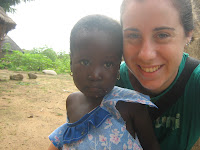Dear Readers,
This is one of the last few blog entries I’ll publish…until I start my new blog to report on new adventures, that is.
I arrived in Ouagadougou yesterday after saying goodbye to my village for good. The last several weeks have consisted of uncertainties, changes, a plethora of emotional highs and lows and more goodbyes than I care to recount. As my last week in Burkina Faso begins, I’m emotionally drained and have begun to feel acutely the weight of two years of challenges and growth. I’m simultaneously sad to leave, knowing that this is not an experience one can ever revisit or recreate, and elated at the prospect of a solid month of relaxing at home and then moving on to explore new corners of the world and, well, get on with life.
After working the last week of volunteer training, I headed to village for four days in order to ready my house for my replacement and to say my goodbyes in the way I wanted – individually, taking the time to visit with friends and their families, take photos and make my exit quietly. Some friends – mostly civil servants – gave me a hard time for not throwing a party or making more of my departure, but that didn’t appeal to me, being beyond my means and the means of the average villager. Instead, my goodbyes consisted of conversation; rehashing funny moments – cultural faux pas and foibles, insect-induced screams, lingual confusion - from my first months in village, promises to stay in touch and to send photos and thanks…many, many thanks.
The hardest goodbyes were with my female friends – the unique, dynamic women whose daily struggles and accomplishments never cease to amaze me – and my babies; the children in neighboring courtyards and my counterpart’s family, whose constant, unwavering affection and utter inability to judge me the way I’m so often judged as a stranger here, has been one of the absolute sustaining elements of my Peace Corps service.

I’m just beginning to realize how challenging moving on from and processing this experience will be. I’m the last of my group to leave Burkina – a few of us are already home, many others are traveling and will be for some time, but I think none of us yet fully realizes the challenges that reintegration and life after Peace Corps will present. I think my time at home and then out in the world again (traveling in SE Asia), will allow me to reflect on these 27 months, on the big questions that I hoped to pursue in coming to Burkina, on my place in the world, and on how I’ve changed; what I’ve learned about myself and how it will impact the choices I make and the path that lies ahead.

I recently received an e-mail from a good friend who had just finished his PC service in Mongolia. He was writing about his post-service travels; relaxing on a Cambodian beach, beyond content with a hammock, a good iPod playlist and some copies of The Economist. He wrote that he was just beginning to reflect on his service and those “big questions” pertaining to development, the efficacy of Peace Corps, the impact volunteers make, and countless other elements of the experience. He said those answers are slow in coming. Right now, it’s hard to imagine having answers to those questions at all – being able to generalize or summarize anything about two years of a life transplanted…it’s hard even to imagine actually being back in the States in six days. That said, I know that I’m tougher, wiser, and, grace of getting knocked down and picking myself back up time and time again, better than I was 27 months ago.
David Mitchell, Cloud Atlas








